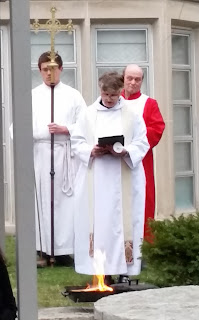They
found the stone rolled away from the tomb, but when they had went in, they did
not find the body. The men they saw said to them “Why do you look for the
living among the dead? He is not here, but has risen.”
We
have had quite a journey to get to this place, on this night. We followers of
Jesus, along with all of the characters who populate this amazing story of
love, Peter, Mary, Joanna, have accompanied Jesus into Jerusalem with the
shouting of Hosannas. We have watched with horror as the events turned violent.
We have been implicated in the apathy that allowed Jesus to be condemned and
killed. We sat in the silence and waited as we believed with those very first
followers, that Jesus, the one who stood for love, the one who healed others,
was dead. That was the end. It looked like failure. It looked like the light
went out. It looked like evil won.
This
evening began with the affirmation that indeed the light did not go out. There
was flame enough to kindle the new fire, and together we sang it back into a
roaring flame. We took solace and strength in hearing stories of salvation
history. Reminding ourselves of God's creativity, reminding ourselves of God's
liberation, reminding ourselves that God puts us back together again after we
have fallen apart. Reminding ourselves of our baptism, when Jesus claimed us as
God's own forever, and we were marked as God's beloved. And here we proclaim
the Alleluias. The Alleluias that fill our hearts and our minds with the love
of God and each other, the alleluias that ring through eternity, and that
shimmer in our own breath and blood.
With
the words, he is not here, but has risen, Mary, and Joanna, and the other Mary,
and all the other women, knew. They knew that this man that they had known in
life, defeated death. They knew that this man they had loved, was all that had
been promised. The temple would be destroyed and raised in three days, on the
third day rise again. They knew what it meant. Jesus was where the God they had
worshipped since they were children, lived now. Jesus was where God walked, and
loved and healed. Jesus whose body was broken on that cross, now is the one who
puts us back together again. The women realized that death does not have the
final word. They knew that it is in dieing that there is new life.
Our
sadness and grief of Holy Week, our brokenness in life, is put back together in
this Easter hope. We are Easter people. We are named, like Mary on that first
Easter morning, and our lives sing with the love that created us, the love that
calls us into being, the love that puts us back together when we break apart, when
we miss the mark, the love that changes our very hearts and souls into a new
creation. And on our hearts, with the cursive of the healed scars, is inscribed
the words, you are loved, broken, healed, love one another.
As
Easter people we don't ignore the reality of our lives, in all of the happiness
and hurtfulness, in all of the care and chaos, in all of the tenderness and
terror. It is never one way or the other, it is always a dance of pain and joy.
But we do live this life fully embraced and empowered by this Easter reality, your
life matters, it matters now. The reality of the cross and the resurrection
shows us that our relationships matter, that dignity and respect matter.
As
Easter people we live in the reality that changed the way we are related to one
another. Power doesn't win, love wins. Darkness does not prevail, light shines
through. Brokenness doesn't end our lives, it only creates the fissures into
which God's love can seep.
And
as Easter people, as people who have been named by Jesus, we are marked and
claimed as God's own. Our hearts and our lives are claimed by the love that
heals us, the love that puts us back together, the love that wins. And from
that love flows the ministry that God calls us to, love one another.
Now,
Jesus dwells with us, and together we are about the business of kingdom
building, as Jesus did and does. It is a kingdom in which all are loved, a
kingdom in which all are fed. A kingdom in which mercy and compassion rule. A
kingdom in which a broken body makes us whole, a kingdom in which the body of
Christ makes us a body of Christ.
As
we walk out of the doors of this church this evening, our work begins. The body
of Christ is at work with God's mission of healing and reconciliation in the
world. It is our work of bearing God's love to those who, like us are broken, it
is our work of bearing God's love in all places and all times. It is our work
of feeding those who are hungry, because we have been hungry. It is our work of
mercy and compassion, because we know what it is like to miss the mark.
We
are Easter people. We walk this journey of life knowing the amazement of
resurrection, and the pain and suffering that precedes it. We are Easter
people. We are nourished by the bread and the body that is broken for us. We
are Easter people, made whole by the love that wins. Alleluia, Christ is risen.









